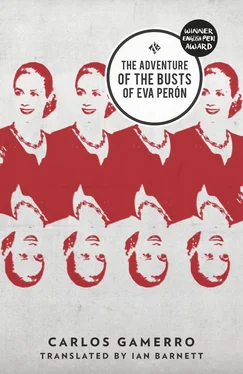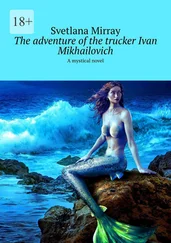Carlos Gamerro - The Adventure of the Busts of Eva Perón
Здесь есть возможность читать онлайн «Carlos Gamerro - The Adventure of the Busts of Eva Perón» весь текст электронной книги совершенно бесплатно (целиком полную версию без сокращений). В некоторых случаях можно слушать аудио, скачать через торрент в формате fb2 и присутствует краткое содержание. Год выпуска: 2015, Издательство: And Other Stories, Жанр: Современная проза, на английском языке. Описание произведения, (предисловие) а так же отзывы посетителей доступны на портале библиотеки ЛибКат.
- Название:The Adventure of the Busts of Eva Perón
- Автор:
- Издательство:And Other Stories
- Жанр:
- Год:2015
- ISBN:нет данных
- Рейтинг книги:3 / 5. Голосов: 1
-
Избранное:Добавить в избранное
- Отзывы:
-
Ваша оценка:
- 60
- 1
- 2
- 3
- 4
- 5
The Adventure of the Busts of Eva Perón: краткое содержание, описание и аннотация
Предлагаем к чтению аннотацию, описание, краткое содержание или предисловие (зависит от того, что написал сам автор книги «The Adventure of the Busts of Eva Perón»). Если вы не нашли необходимую информацию о книге — напишите в комментариях, мы постараемся отыскать её.
Carlos Gamerro's novel is a caustic and original take on Argentina's history.
The Adventure of the Busts of Eva Perón — читать онлайн бесплатно полную книгу (весь текст) целиком
Ниже представлен текст книги, разбитый по страницам. Система сохранения места последней прочитанной страницы, позволяет с удобством читать онлайн бесплатно книгу «The Adventure of the Busts of Eva Perón», без необходимости каждый раз заново искать на чём Вы остановились. Поставьте закладку, и сможете в любой момент перейти на страницу, на которой закончили чтение.
Интервал:
Закладка:
‘Back to the factory! Back to the factory!’ shouted a distant voice in the fog, and Marroné, whose brain was too battered to think for itself, followed the order, dragging himself out of the workshop on all fours.
On his way to the factory he came across the young rebel office worker, Ramírez, running along the outer wall of the transept clutching a machine gun. They took cover at what had been the inner corner of the left transept of the building and crouched down together for a moment.
‘What are you doing here?’ Marroné asked him in amazement.
‘To Die in Madrid!’ came back the cryptic reply and, planting one knee squarely on the ground, he started firing on the tank, which was pivoting in search of a target. Two bottles came from nowhere and smashed over its skin of iron, bathing it in fuel but failing to burst into flame. ‘What are they trying to do? Clean it? The bloody incompetents spout World Revolution and don’t even know how to mix a bloody Molotov,’ spat his mind in contempt. To avoid being blown to pieces together with Ramírez, Marroné staggered off, his arms wheeling like a drunk. What was all this? What was Ramírez, the paper-pusher who’d been wearing a pink shirt and green tartan tie when they’d met, doing firing on an armoured car with a machine gun? Who was in charge of the casting in this ridiculous film?
No sooner had he emerged from the smoke and the entrance was in sight than a giant’s hand slammed into his chest, sending him flying backwards, skidding wildly on his backside. As he flailed to free himself from its grip, he realised he was soaking wet.
‘Whoa, hey! It’s Ernesto!’
His own men had hit him with the fire-hose. ‘At least we didn’t plug you one,’ said the arms that picked him up off the floor and dragged him inside by the armpits. Before he could even attempt to regain his senses, he was surrounded by half a dozen workers asking for all sorts of instructions and, as he peered over the ring of heads, he caught sight of the face of María Eva, her FAL slung over her shoulder; she saluted gravely when their eyes met. She had tied her hair back for combat, making her look even more like the Eva in the photonovel.
‘Comrade María Eva is in charge of defence operations,’ he said off the top of his head to wriggle out of it. ‘I want you to obey her every command as if it were my own,’ he said, with more composure, and headed into the factory to find a safe place to hide until all this madness had blown over.
Grenades came through the skylights and windows with monotonous regularity and, if you looked up or weren’t wearing your helmet, the vicious rain of glass could leave you badly cut, or worse still, quite blind. But no sooner had they landed than they were picked up and launched back by the ever-vigilant workers, usually with unerring aim, and controlled fires were dotted about, their smoke neutralising the gas and making the air still just about breathable.
His first idea had been to take refuge under a desk or sofa bed in one of the offices, but then he called to mind the fuel barrels and garlands of grenades, as well as Miguel’s promise to blow the factory sky high if it was attacked, and it no longer seemed like such a good idea. He was in the grip of these deliberations, crossing the central nave in the direction of the apse, when a hand deposited a jar of marbles and ball bearings in his, and a voice yelled in his ear:
‘It’s the Cossacks! The Cossacks are coming!’
His sense of reality was so badly shaken by now that he wouldn’t have been at all surprised when he turned round to find himself face to face with a host of fierce, bearded faces wielding sabres and wearing fur caps; but as usual the reality was even worse: in through the entrance to the atrium, whose barricades of furniture and beams had been swept aside by the personnel carrier, charged a troop of mounted police on monstrous brown steeds, galloping at full tilt and wielding what might have been truncheons or whips. Again the sense of unreality trumped common sense, and Marroné just stood there in the middle of the nave, as if, by staring hard at them, these figments of the enchanters who were pursuing him would pop and vanish like bubbles into the air. What was wrong with all these people? How on earth could a fucking cavalry charge be bearing down on him , a St Andrew’s graduate and head of procurement at Tamerlán & Sons, as if they were back in the Middle Ages? Luckily for him, someone else, of a more practical, less metaphysical turn of mind, hurled a paper grenade at the wall of jostling steeds, whereupon it promptly burst, sending clouds of pepper into the air and making the horses rear and prance, forcing their riders to halt the charge to bring them under control.
He was running for the apse when the voice of command reached his ears once again.
‘The marbles! Throw the marbles!’
Blindly, he obeyed. Maybe too blindly, for instead of throwing the jar backwards between himself and the horses, Marroné flung it forwards , and when the jar shattered on the floor and the coloured marbles scattered in all directions, it was Marroné that went skating uncontrollably and fell flat on his face. The pain as he hit the floor was unspeakable and for a moment he thought he’d swallowed some of the marbles, which now floated in his mouth in some kind of thick soup, and it was only after taking cover behind one of the brown machines and spitting a spurt of blood into his palms that he understood he’d split his lip, bitten his tongue and broken God knows how many teeth. ‘With everything I’ve got on, and I have to make a dental appointment!’ grumbled the old part of his mind indignantly, still obstinately running about bumping into the walls of his skull like a headless chicken.
Still, there must have been enough marbles rolling about to have come between him and the horses, for they had gone into a stiff-legged Holiday on Ice routine, bumping into and falling over each other with great thuds, squashing at least two riders against the cement floor or the machines.
‘Nice one! Way to go, Ernesto!’ he heard someone shout. He poked his head out of his hiding place; an iron hand closed over his arm like a mantrap and hauled him to his feet.
‘Don’t hurt me! I’m a hostage!’ he was about to scream, but he recognised Saturnino’s features just in time and saved the disclaimer for the right occasion.
‘Ernesto! You been hit?’ he asked him in concern, and then, in reply to the burbling sounds coming from Marroné, who discovered he could barely talk for the blood pouring from his mouth, he shouted, ‘Come on! We’re falling back!’
Saturnino led Marroné towards the barricade, which followed the line of blue machines. They crouched low as they ran, because shots could now be heard inside the factory too. Manning the barricade were a couple of workers with small-arms, and a guerrilla with a light machine gun, while most of the others had only catapults and bolts; three men lay on the ground, their white overalls stained with blood. Two weren’t moving: one, unrecognisable for the burns to his face, giving off the pestilential stench of charred flesh; another, fists clenched, as if someone had been trying to prise something away out of them, and teeth bared, as if they too had been summoned in defence of it. It took Marroné a couple of seconds to realise that what he was looking at was a corpse; and another to notice that this was — or had been — the young worker called Zenón. The third, eyes half-closed, was fat and very tall, and was frothing at the mouth, his forearms flapping back and forth, like one of those wind-up bath toys; him too Marroné recognised, for he had got to know all of them by now: he was a River Plate supporter like himself, and they’d spent a morning chatting about the championship they might win after eighteen years without a trophy. ‘We won’t let it slip away this time,’ the young, fair-haired giant had assured him with a slap on the back that almost broke his spine. Kneeling beside them, Edmundo Rivero hid his heavy face in his great hands and wept.
Читать дальшеИнтервал:
Закладка:
Похожие книги на «The Adventure of the Busts of Eva Perón»
Представляем Вашему вниманию похожие книги на «The Adventure of the Busts of Eva Perón» списком для выбора. Мы отобрали схожую по названию и смыслу литературу в надежде предоставить читателям больше вариантов отыскать новые, интересные, ещё непрочитанные произведения.
Обсуждение, отзывы о книге «The Adventure of the Busts of Eva Perón» и просто собственные мнения читателей. Оставьте ваши комментарии, напишите, что Вы думаете о произведении, его смысле или главных героях. Укажите что конкретно понравилось, а что нет, и почему Вы так считаете.











